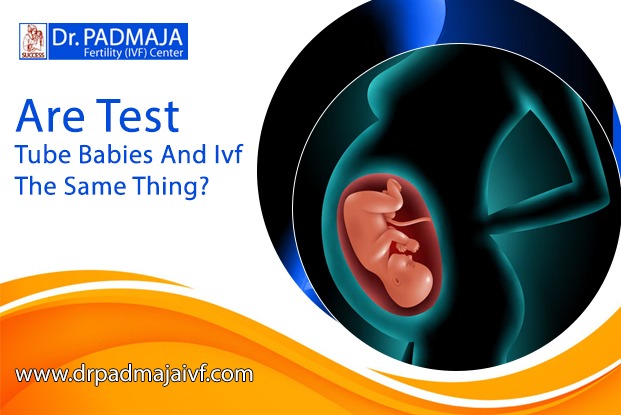In recent years, the terms “test tube babies” and “IVF” (In Vitro Fertilization) have become increasingly common in discussions surrounding fertility treatments. Many people, however, still wonder whether these terms refer to the same process or if there are distinct differences between them. This blog aims to clarify the relationship between test tube babies and IVF, while also highlighting the best IVF center in Hyderabad, particularly focusing on Dr. Padmaja IVF Center.
Understanding IVF
IVF is a complex medical procedure that involves several steps to help couples struggling with infertility. The process typically includes the stimulation of the ovaries to produce multiple eggs, retrieval of these eggs, fertilization with sperm in a laboratory setting, and finally, the transfer of returning one or more embryos to the uterus.
The term “test tube baby” originated in the late 1970s when the first successful IVF procedure resulted in the birth of Louise Brown, the world’s first baby conceived via IVF. The name comes from the fact that fertilization occurs in a laboratory dish (often referred to as a test tube). Today, however, the terminology has evolved, and IVF is the more accurate term to describe the procedure.
Test Tube Babies: A Broader Concept
While “test tube baby” is often used synonymously with IVF, it can also refer to any baby conceived through assisted reproductive technologies (ART), including other methods like Intracytoplasmic Sperm Injection (ICSI) and Preimplantation Genetic Testing (PGT). In this sense, all test tube babies are conceived through IVF or its variations, but not all IVF babies are exclusively referred to as test tube babies.
At Dr. Padmaja IVF Center, one of the best IVF centers in Hyderabad, patients have access to a range of ART procedures tailored to their unique needs. This flexibility allows couples to choose the most suitable method for their specific circumstances, whether that involves traditional IVF, ICSI, or other innovative techniques.
Why Choose IVF?
Couples may opt for IVF for various reasons, including:
Age-related Fertility Issues: As women age, their egg quality and quantity diminish. IVF can help increase the chances of conception by allowing for the selection of the healthiest embryos.
Blocked Fallopian Tubes: If the fallopian tubes are damaged or blocked, IVF provides a solution by bypassing the need for the tubes altogether.
Male Factor Infertility: In cases of low sperm count or poor sperm motility, IVF with ICSI can be an effective treatment option.
Unexplained Infertility: For couples who have not been able to conceive despite trying for an extended period, IVF can offer new hope.
Genetic Screening: With the advancements in genetic testing, IVF allows for the screening of embryos for genetic disorders, providing couples with peace of mind.
At Dr. Padmaja Fertility Center, patients receive comprehensive evaluations to determine the underlying causes of infertility, ensuring personalized treatment plans that maximize their chances of success.
The IVF Process at Dr. Padmaja IVF Center
The journey through IVF can be both exciting and daunting. At Dr. Padmaja IVF Center, the process is designed to be as smooth and supportive as possible:
Consultation and Testing: The first step involves a detailed consultation with Dr. Padmaja and her experienced team. They will conduct necessary tests to understand the couple’s fertility status and develop a tailored treatment plan.
Ovarian Stimulation: Once the plan is in place, the woman will undergo ovarian stimulation using hormonal medications to encourage the production of multiple eggs.
Egg Retrieval: After the eggs mature, a minor surgical procedure is performed to retrieve them from the ovaries.
Fertilization: The retrieved eggs are then fertilized with sperm in the laboratory. This is where the term “test tube baby” becomes relevant, as fertilization takes place in a controlled environment.
Embryo Transfer: After a few days, the healthiest embryos are selected and transferred into the woman’s uterus, where they may implant and develop into a pregnancy.
Follow-Up: A pregnancy test is conducted a couple of weeks later to determine if the procedure was successful.
Conclusion
In summary, while the terms “test tube baby” and “IVF” are often used interchangeably, they are not entirely synonymous. IVF is the medical procedure that leads to the conception of test tube babies, but the term also encompasses various assisted reproductive technologies. For couples seeking expert care in their journey towards parenthood, Dr. Padmaja IVF Center stands out as one of the best IVF centers in Hyderabad. With a dedicated team and advanced techniques, they offer hope and support to those navigating the challenges of infertility. If you’re considering IVF, consulting with Dr. Padmaja and her team can provide you with the guidance and care you need for a successful outcome.
About The Author :

If Dr. Padmaja Divakar is a public figure or a professional in a specific field, I recommend checking her official website, professional profiles, or reliable online sources for the most up-to-date and accurate information about her background, qualifications, and achievements.
Frequently Asked Questions (faqs)
1.What is a test tube baby?
A test tube baby refers to a baby conceived through assisted reproductive technology, specifically via In Vitro Fertilization (IVF). The term “test tube baby” is somewhat outdated, but it is still commonly used to describe this process.
2.What is IVF?
IVF, or In Vitro Fertilization, is a medical procedure where an egg is combined with sperm outside the body in a lab (in vitro), resulting in fertilization. The resulting embryos are then transferred to the uterus.
3.Are test tube babies and IVF the same thing?
Yes, the term “test tube baby” generally refers to babies conceived through IVF. However, IVF encompasses more than just the conception; it involves several steps, including egg retrieval, fertilization, and embryo transfer.
4.How does IVF work?
IVF involves several steps:
Ovarian Stimulation: Fertility medications are used to stimulate the ovaries to produce multiple eggs.
Egg Retrieval: Eggs are collected from the ovaries using a minor surgical procedure.
Fertilization: The retrieved eggs are fertilized with sperm in a laboratory.
Embryo Transfer: One or more healthy embryos are selected and transferred to the uterus.
5.Is IVF only for women with fertility issues?
While IVF is commonly used for couples facing fertility issues, it can also be used for other reasons, such as genetic screening, single parents, or same-sex couples wishing to conceive.
6.What are the success rates of IVF?
Success rates vary based on factors such as age, health, and the specific fertility clinic. Generally, younger women have higher success rates, with many clinics reporting around 30-40% success per cycle for women under 35.

